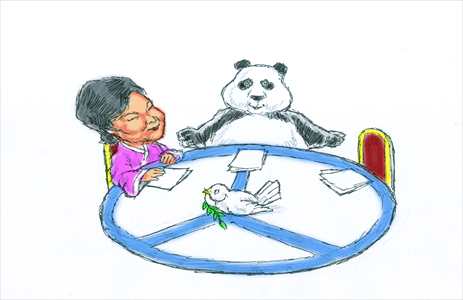South Korea can get more than symbols from Beijing

Whether South Korean President Park Geun-hye's "trustpolitik" is merely a slogan or a solid policy strategy will be revealed during her visit to China starting on Thursday.
Superficially, the combined US and North Korean hard lines leave little space for Park to obtain more from China than a similar joint statement to that issued by Chinese President Xi Jinping and his US counterpart Barack Obama at their recent summit.
Although useful to Park for domestic consumption, a joint statement that a nuclear-armed North Korea is not acceptable will do nothing to resolve the fundamental nuclear problem with North Korea.
Is it possible for Park to get more from China than a symbolic statement? The answer is definitely yes.
South Korea can propose at least three types of "three party talks" at the summit that would put South Korea in the driver's seat and break the deadlock with North Korea.
The first and most important trilateral engagement would lend substance to her "Northeast Asia Peace Initiative."
At a minimum, a regional framework that could reverse North Korea's nuclear breakout requires a regional treaty of cooperation that leads to anything from the end of a state of war to the termination of sanctions and the creation of a nuclear weapons free zone.
This regional security settlement would be a comprehensive agreement or treaty that would require ratification by a number of states. Provisions would come into effect in a phased manner - immediately upon ratification or when various conditions are met.
The benefits that might flow to North Korea would occur only if the North fully dismantled its nuclear capabilities under monitoring and verification by the International Atomic Energy Agency or a substitute regional inspectorate established as part of the treaty. Non-nuclear states such as South Korea and Japan could pull out of the treaty after five years if the North had not dismantled its nuclear program by then.
South Korea may lack the great power needed to impose a new order. But it can delineate a new strategic framework that shapes the geostrategic environment rather than trying to manage the North's bad behavior at the margin.
South Korea's second "trilateral" should be to propose to China that it work with the South and the US to generate a common position on exactly what North Korea must do to obtain a legally binding guarantee that it won't be attacked with nuclear weapons. At this time, such a common position does not exist.
The third trilateral is to enact inter-Korean trust-building in partnership with China.
Park should propose a cooperative approach whereby Chinese and South Korean joint ventures are created to participate in legitimate economic engagement, to invest in the Chinese-North Korean free trade zones on the Yalu River and elsewhere, and to solicit Chinese investment in Kaesong in return for expanded South Korean-Chinese economic support in the rest of North Korea.
The South Korean government would cover the sovereign risk faced by South Korean partners in such joint ventures.
This trilateral approach would use market-based mechanisms to implement the engagement strategy involving China and the two Koreas, not government agencies.
A specific angle for Chinese-South Korean technical assistance to the North could build on the Obama-Xi summit commitment to work together to rid the world of the use of climate and ozone-layer destroying hydro-fluorocarbons from industry by working with the North to implement this change in industrial practice.
These three trilateral approaches will lend substance to Park's notion of trust-building with North Korea, and will enlist China and the US in collaborations led by South Korea.
In this manner, South Korea may start the process whereby the full set of the necessary enabling conditions for denuclearizing North Korea are established, a process that will take some years to negotiate in full in a six-party framework.
Nonetheless, it is entirely feasible to constitute all elements of a new strategic framework, provided all parties maintain a clear focus and avoid needless delays over minor issues.
At this juncture, only Park can provide the necessary leadership to move this agenda forward.
The author is director of Nautilus Institute, and professor at RMIT University. opinion@globaltimes.com.cn